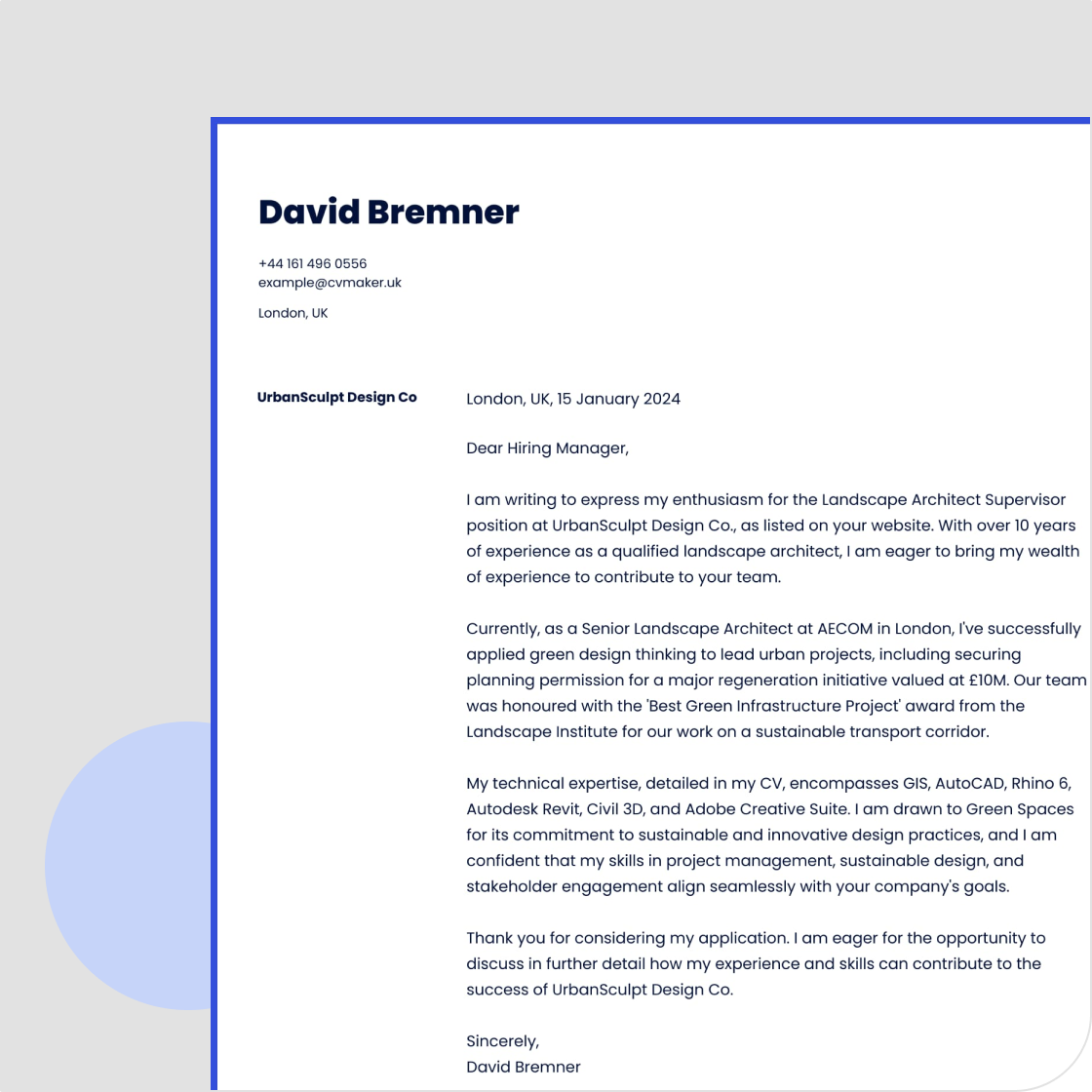Writing the perfect cover letter can feel daunting, especially when you’re unsure about how long it should be. Is shorter always better, or do longer cover letters stand out? If you're applying for a job in the UK, understanding the ideal cover letter length is essential to make a great impression on potential employers.
This guide will walk you through the perfect cover letter length for UK jobseekers, offer practical tips, highlight common mistakes, and provide UK-centric examples to tailor your application. By the end, you’ll know the recommended cover letter length, how to write a cover letter that is concise, impactful, and designed to grab the attention of hiring managers.

What is the purpose of a cover letter?
Before delving into the cover letter length debate, let's understand the primary purpose of a cover letter. It serves as an introduction, presenting a snapshot of your qualifications, skills, and experiences relevant to the position you're applying for. A well-crafted cover letter showcases your enthusiasm, highlights your unique value proposition, and compels the reader to review your CV with keen interest. It should be tailored to each specific job application, reflecting your genuine interest in the role and the company. Still not sure if you need a cover letter? Learn more about if a cover letter is necessary for you next job application.
What is the optimal cover letter length in the UK?
There’s no strict rule for cover letter length, but UK employers generally prefer the typical length of cover letter to be between 250 and 400 words. This is long enough to showcase your key qualifications while respecting the employer’s time. Conciseness is key; think of your cover letter as an introduction that complements your CV rather than repeating it.
Use the following guidelines to refine your approach:
Keep it to one page. Anything longer runs the risk of being overlooked.
Focus on impact. Highlight experiences and skills that align directly with the job description.
Tailor it. Customise each cover letter to the role and company.
| Application letter type | Word count | Comments |
|---|---|---|
| Standard UK cover letter | 250–400 words | Industry standard for most applications |
| Academic/research cover letter | 400–600 words | More detailed to reflect achievements |
| Senior/executive level | 300–500 words | Highlights leadership and strategy |
Example of the ideal length for a cover letter

How to keep your cover letter concise
UK recruiters spend an average of 7 seconds scanning an application initially. A concise cover letter increases the chances of them fully engaging with your application. It demonstrates clear communication skills, professionalism, and respect for the reader’s time.
By focusing on quality over quantity, you can showcase your suitability for the role without unnecessary fluff. Keep track of your cover letter word count to maintain focus!

Key formula for an effective letter
1. Hook: A compelling opening that states your interest in the role.
2. Core: Key skills and accomplishments that align with the job requirements.
3. Closer: A strong closing paragraph summarising your suitability and enthusiasm.
Check out these examples for a short cover letter:
How to structure your cover letter
A cover letter should balance brevity with substance, providing meaningful insights into your qualifications without being overly short or lacking effort. Focus on highlighting key experiences and accomplishments that align with the job requirements, using specific examples to showcase your skills. While longer cover letters may be suitable for senior, executive, or academic roles requiring detailed explanations, it’s still essential to remain concise and avoid unnecessary elaboration. Employers in the UK expect a polished and professional format.
Follow this structure for clarity and readability:
1. Introduction
Address the hiring manager by name where possible (e.g., “Dear Ms Smith”).
Mention the role you’re applying for.
Briefly summarise your top qualifications.
Example
"I’m excited to apply for the Digital Marketing Specialist role at ABC Agency. With three years of experience increasing web traffic by 150% through strategic SEO campaigns, I’m eager to bring my skills to your innovative team.”
2. Main body
Break this into 2–3 short paragraphs to maintain flow.
Highlight key achievements, using numbers where possible.
Show how your experience matches the job description.
Example
“In my role as a Marketing Associate at XYZ Ltd, I managed a team to implement a social media campaign that boosted engagement by 30% in Q1 2023. I pride myself on delivering measurable results and tailoring campaigns to target audiences effectively. I’ve attached further examples of my work for review.”
3. Closing paragraph
Reiterate your enthusiasm and suitability.
Include a call to action, such as scheduling an interview.
Example
“I would welcome the opportunity to discuss how my experience in data-driven marketing could help ABC Agency achieve its 2025 growth targets. Thank you for considering my application – I look forward to hearing from you.”
Explore these cover letter examples for more inspiration:
Top 5 tips on how to keep your cover letter short, clear, and concise
To help you meet the ideal length standards, here are a few handy tips for writing an effective cover letter:
Master the structure: A well-organised cover letter is key. For guidance, explore our detailed article on structuring your cover letter.
Start strong: Open with a captivating introduction that clearly states the position you’re applying for and briefly highlights your most relevant qualifications. Learn more about how to start a cover letter.
Focus on relevance: Showcase only the qualifications and experiences that directly align with the job requirements, avoiding unnecessary details or an exhaustive work history.
Leverage bullet points: Use bullet points to present achievements in a clear, concise, and easily digestible format, ensuring your key points stand out.
Keep it concise: Aim for a length of 250 to 400 words – enough to provide valuable insights while respecting the reader’s time. Not sure how to sign-off your cover letter? Read these tips on how to end a cover letter.
At the end of the day, both a cover letter and a CV are like personal marketing tools. Sometimes, a well-crafted cover letter can be the deciding factor in whether or not you secure an interview. So, it's crucial to find that perfect balance between keeping your cover letter concise and tailoring it to the specific job you're applying for.
Common mistakes to avoid
Even the best candidates can trip up with these cover letter pitfalls:
Overloading with details: Listing your entire work history belongs on your CV – not in a brief cover letter.
Generic openings: Avoid phrases like “To whom it may concern.” It’s better to take the time to research the hiring manager’s name.
Excessive length: A cover letter over 400 words might lose the recruiter’s interest.
Ignoring the job description: Make sure your skills and experiences address the specific qualifications listed.
American spelling or format: Use UK English (“organisation” not “organization”) and follow British formatting conventions.
Pro tip
Always have someone review your application before submitting it. A fresh pair of eyes can catch typos, awkward phrasing, or unclear points you might have missed.
Tips for mobile-friendly applications
Since many UK recruiters review applications on-the-go, ensure your cover letter is easy to read on smaller screens:
Use short paragraphs (2–3 sentences).
Include white space between sections.
Avoid overly complex words or dense formatting.
Key takeaways
An impactful cover letter that’s tailored to the job can make all the difference in securing your next opportunity. Stick to clear, concise wording to show off your qualifications and align your skills with the employer’s needs. The trick is to create a cover letter that complements your CV and shows off your best qualifications and experiences. Think of it as a dynamic duo that tells your story and convinces a potential future employer why you are the right for the job.

Next steps?
If you're ready to kickstart your journey but unsure of where to begin, our team is here to assist you in creating a job-specific CV and cover letter through our professional CV Writing Service. For additional inspiration, we encourage you to explore our comprehensive collection of cover letter templates or refer to our detailed guide on how to write a good CV. Already got a head start on your CV and matching cover letter? Take a look at our guide on how to send your CV via email before you apply for your next job!
FAQs
How long should a covering letter be in the UK?
The ideal length for a covering letter in the UK generally falls within one page, typically ranging from 250 to 400 words. This length allows you to provide sufficient information while maintaining conciseness and ensuring the reader's attention is captured effectively. Learn more about how long a CV should be to accompany your cover letter.
Is a two-page cover letter too long?
A two-page cover letter is generally considered too long, as it may exceed the reader's attention span and could come across as excessive. It's important to prioritise the most relevant and compelling information, focusing on key qualifications and experiences that directly align with the job requirements.
How long should an academic cover letter be?
For academic cover letters, the length may vary depending on the specific requirements outlined by the institution or position. In general, academic cover letters tend to be slightly longer than traditional cover letters, ranging from one to two pages. However, it's still essential to maintain conciseness and emphasise the most pertinent academic achievements and research experiences relevant to the role. Adhering to any specific guidelines provided by the institution or position is crucial in ensuring your cover letter is well-received.
How long is too long for a cover letter?
A cover letter is considered too long if it exceeds one page or goes beyond 400 words for most roles. UK employers typically prefer concise, focused cover letters that highlight your most relevant qualifications without unnecessary detail. Longer cover letters risk losing the reader’s attention and may come across as unfocused or overly informative. However, for senior, executive, or academic positions, a slightly longer cover letter (up to 600 words) may be acceptable if it provides detailed, relevant insights. Always aim for clarity, brevity, and relevance to make the best impression.
How many words should a cover letter be?
A cover letter should ideally be between 250 to 400 words. This length provides enough space to highlight your key qualifications, experiences, and enthusiasm for the role while remaining concise and easy to read. For senior, executive, or academic positions, you might extend it slightly, but staying within this range ensures your cover letter is impactful without overwhelming the reader. Always focus on relevance and clarity to make every word count!
)



)

